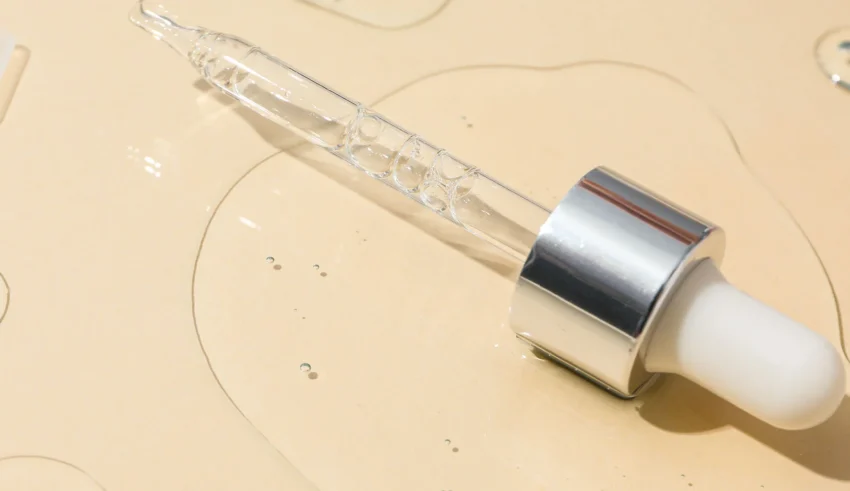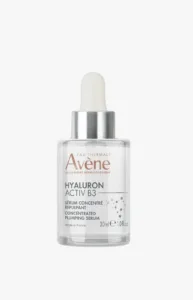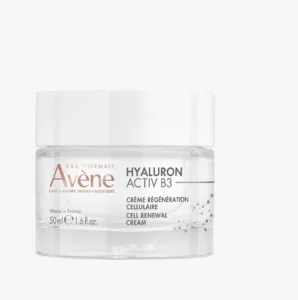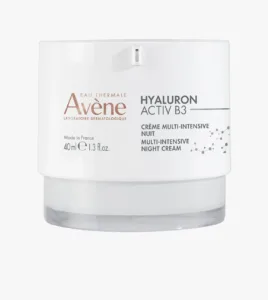
If there’s one skincare ingredient that gets you moisturized fast, it’s hyaluronic acid. You’ll find it as an active ingredient in virtually every category of skincare product: serums, cleansers, moisturizers and more. There’s a reason it’s so ubiquitous: not only is hyaluronic acid highly effective at hydrating the skin, it also minimizes the signs of aging, as plump, hydrated skin makes fine lines and wrinkles less visible. Read this article from The Dermo Lab, in collaboration with Dr. Alaa Ouda, to find out the best skin care products with hyaluronic acid.
Here’s a scientific guide to the top ten benefits of hyaluronic acid:
1. Hydration
Hydration = Hyaluronic Acid.
Think of hyaluronic acid as a BIG glass of water for your skin. It can hold up to 1,000 times its molecular weight in water. Hyaluronic acid penetrates your skin and binds water to skin cells, providing all skin layers with precious, rejuvenating hydration. In fact, hyaluronic acid is the perfect example of how skin care based on only a few ingredients can deliver real results.
Dr. Alaa Ouda notes that all skin types benefit from hyaluronic acid, with particular importance for dry skin.
2. Humectant
Humectants are widely used in skincare. Think of a humectant as a sponge: it continues to draw in and retain moisture after collecting it. It enables hydrogen bonding and attracts water. Examples of humectants in skin care products include ingredients such as glycerine, sorbitol (sugar alcohol), hexylene and butylene glycol and, of course, hyaluronic acid.
According to Dr. Alaa Ouda, hyaluronic acid is a humectant-type moisturizer with the ability to:
- Draw water from the dermis to the epidermis, from the inside out, or from damp weather to wet weather, from the outside in.
- Help your skin stretch and soften, reducing fine lines and wrinkles.
Dr. Alaa Ouda explains that moisturizers fall into 3 groups:
- occlusive
- humectants
- emollients
She stresses that when choosing the best skin care products containing hyaluronic acid, you should also look for other moisturizer combinations to achieve the best skin hydration results, such as occlusives and emollients or other humectants.
3. Lipid barrier improvement
The main function of your skin is to protect your body. Obviously, the skin protects the internal organs, muscles, bones, etc. from the outside world. But it also protects the body from the harmful toxins that bombard it on a daily basis.
The upper layer of the skin (the epidermis) bears the brunt of external aggression (toxins). As we age, the skin’s lipid barrier (fatty acids that retain water and prevent irritants from penetrating the skin) slows down. All factors, from UV rays to environmental pollution and lifestyle choices (such as smoking), cause damage. This damage translates into an increase in fine lines and wrinkles, dark spots and drier skin.
Hyaluronic acid reinforces the skin’s natural barriers to help retain moisture and achieve an even more spectacular moisturizing effect. Over time, it can help slow the deterioration of the lipid barrier, protecting and strengthening it.
4. Wound healing
Hyaluronic acid also plays a key role in wound healing. It is naturally present in the skin, but its concentration increases when wounds need to be repaired.
Hyaluronic acid helps wounds heal faster by regulating inflammation levels and signaling the body to build more blood vessels in the damaged area.
It also possesses antibacterial properties and can therefore help reduce the risk of infection when applied directly to open wounds. In addition, it is effective in reducing gum disease, accelerating healing after dental surgery and eliminating ulcers when used locally in the mouth.
5. Firmer complexion
Nobody wants flabby skin. We never do. As we age, the skin’s elastin breaks down and skin loses its elasticity. A quick trick to check your elastin (the bounce) is to pinch the skin on the top of your hand. If it bounces back quickly, you still have plenty of elastin. With age, skin bounces back less quickly.
Hyaluronic acid will NOT replace elastin, but it can help give skin a firmer appearance. By filling the skin with moisture, hyaluronic acid firms the complexion as a whole. It helps firm facial contours for a more youthful appearance.
Dr. Alaa Ouda adds that hyaluronic acid-based injectable fillers can stimulate collagen production in the skin. Collagen is another protein that contributes to skin firmness and elasticity.
6. Smoother texture
Just as it makes your skin firmer, hyaluronic acid also smoothes skin texture. The result is a silky-smooth finish that’s visible and palpable.
If the skin has visible acne scars, hyaluronic acid won’t fill them. But, combined with a tool like the Dermaroller, hyaluronic acid and the Dermaroller can, over time, give the skin a smoother appearance.
7. Anti-aging
Around 50% of the body’s total hyaluronic acid is present in the skin. Variations in this quantity, possibly due to UV exposure, can lead to the formation of wrinkles. Hyaluronic acid can significantly reduce the depth of wrinkles and improve skin firmness and elasticity.
Hyaluronic acid is a truly beneficial ingredient for your skin. It helps reduce the visibility of fine lines and wrinkles by retaining moisture in the skin, creating a plumping effect. When your skin is protected and hydrated, skin cell production can increase, as the skin is not busy fighting for moisture. This results in smoother, plumper skin cells.
The skin around your eyes is one of the first to show fine lines and wrinkles. Using an eye cream twice a day helps keep skin supple and hydrated, and prevents new wrinkles from forming.
8. Anti-pigmentation
Although it doesn’t accelerate the cell renewal process, hyaluronic acid promotes skin cell regeneration by providing additional hydration and skin barrier protection. When cell renewal is more important, hyaluronic acid also helps reduce and prevent age spots and pigmentation problems. Dr. Alaa Ouda adds that hyaluronic acid improves uneven texture, especially when combined with exfoliating agents such as retinal and acids or niacinamide.
9. Clarity
When oily skin is deprived of hydration (water), it compensates by producing sebum. It’s a common misconception that oily, acne-prone skin doesn’t need moisturizing, but in fact it does. By promoting the skin’s water balance, hyaluronic acid prevents the overproduction of sebum, which clogs pores and causes breakouts.
10. Reduced dermatitis
Hyaluronic acid can help improve symptoms of mild to moderate eczema.
And there they are, the top ten benefits of hyaluronic acid. To enjoy hyaluronic acid in all its moisturizing and anti-aging glory, try the following products:
Eau Thermale Avène Hyaluron Activ B3 Concentrated Plumping Serum
Apply serum in the morning and/or evening.
Eau Thermale Avène Hyaluron Activ B3 Day Cream
Apply to the face, neck, and décolleté, by itself or following your serum.
Eau Thermale Avène Hyaluron Activ B3 Multi-Intensive Night Cream
Apply 2 pumps to the entire face, neck, and décolleté in the evening.











